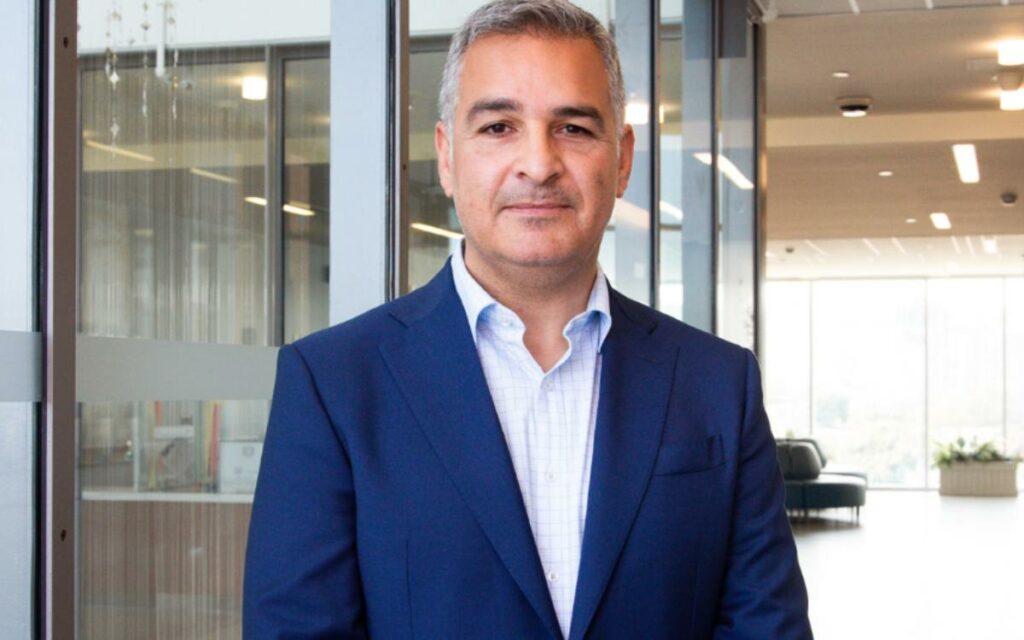
Stelios Georgiades (pictured) is driving an ambitious new project that will see the creation of a Learning Health System for children with neurodevelopmental disorders, thanks to a new gift of $1.8 million from the Azrieli Foundation to McMaster University. Photo credit: McMaster University/Maxine Gravina
Karen Beattie, a researcher in the Department of Pediatrics at McMaster University, knows firsthand how challenging it can be to navigate a siloed health care system. She’s been doing it for a decade, since her son Freddie was born at 29 weeks, weighing just under two pounds.
Like many preemies, Freddie was at risk for developing lifelong neurodevelopment complications. As he grew, he struggled with self-regulation and was eventually diagnosed with Developmental Coordination Disorder. Beattie received the appropriate referrals, but she soon found herself frustrated by a lack of coordination among Freddie’s doctors, his therapists, the services themselves and the school system.
“Even though we had access to excellent services — many within the same walls — they weren’t communicating with one another,” said Beattie. “I knew that if I was struggling to navigate the system as a privileged person, vulnerable families would be finding it much more difficult.”
Beattie is far from alone. In Canada, 74 per cent of children diagnosed with a disability are classified as having a Neurodevelopmental disorder (NDD), such as Autism or ADHD. In Ontario, there are more than 300,000 families with children who have an NDD diagnosis. For these families, getting ongoing support can be a challenging experience since physical and mental conditions are often separated by diagnosis, making the system difficult to access, navigate and negotiate.
“Research evidence rarely makes it to practice, and despite increased funding and attention paid to neurodevelopmental disorders in Canada, waitlists continue to grow,” said Stelios Georgiades, an associate professor in the Department of Psychiatry and Behavioural Neurosciences at McMaster University. He is also director of the Offord Centre for Child Studies, co-director of the McMaster Autism Research Team, and the inaugural McMaster Children’s Hospital Chair in Autism and Neurodevelopment.
Georgiades is driving an ambitious new project aimed at addressing and eliminating these gaps, thanks to a new gift of $1.8 million from the Azrieli Foundation to McMaster University. The Pediatric Learning Health System (LHS) for Neurodevelopment, housed at the Ron Joyce Children’s Health Centre, part of Hamilton Health Sciences’ McMaster Children’s Hospital, will embed research, resources, skill sets, expertise and patient and family perspectives directly into the care process, allowing for continuous communication, improvements and implementation of best practices in real time.
“It’s about creating a system where people from all parts of the research and care process provide input to improve healthcare outcomes,” said Naomi Azrieli, chair and CEO of the Azrieli Foundation.
“When you share information, you can inspire positive change. We have taken a giant step toward stimulating system-wide change, and we look forward to what we can accomplish in this space together,” she said.
“This important work would not be possible without the support of the Azrieli Foundation,” said Paul O’Byrne, dean and vice-president of McMaster’s Faculty of Health Sciences and co-investigator on the project.
“We are grateful for this investment, and we look forward to the important advancements it will enable.”
The success of this project hinges on the collaboration with patient partners, one of whom is Beattie and her son, Freddie, as well as with several key stakeholders, including Hamilton Health Sciences’ McMaster Children’s Hospital, the McMaster Health Forum, Offord Centre for Child Studies, CanChild, McMaster Autism Research Team (MacART), Department of Psychiatry and Behavioural Neurosciences, Department of Pediatrics and several community partners.
As part of this unique LHS, patients, families and clinicians will have access to the same digital family portal, which means caregivers won’t be burdened with the need to repeat their stories to different specialists throughout their child’s lifespan. This portal will also collect data to monitor the developmental trajectories and outcomes of Canadians living with NDDs and their families as they move through our social, health and education systems from infancy through to adulthood.
“While many health care organizations aspire to create a Learning Health System, few have made the necessary investments in their data assets to carry out the kind of research and analytics that would exemplify a successful LHS,” said Jeremy Petch, co-principal investigator and director of the Centre of Data Science and Digital Health at Hamilton Health Sciences.
“This partnership has provided an essential catalyst that’s really ignited the passion of our clinical and leadership teams to engage in a major reinvention of how we care for our patients. We hope that by creating this infrastructure and demonstrating the impact it can have, we’ll create a blueprint that other organizations can use to accelerate their efforts,” said Petch.
While the initial pilot LHS is based in Hamilton, Azrieli support will also be used to scale the project by bringing together national partners whose common goal is to improve coordination of evidence-based services and clinical experiences for families of children with neurodevelopmental disorders (NDDs) across Canada.
This article was first published on Daily News. Read the original article.






